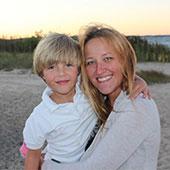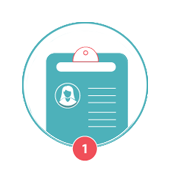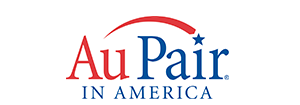AU PAIR VISA INFORMATION
TRAVEL AND VISA INFORMATION
Au pairs arrive in the United States with a J-1 visa. The visa is a full-page stamp in your passport that says “J-1 Visa United States of America” across the top. On the left side there is a photograph, and next to this is the name of the city where it was issued, your name and passport number. Under “Entries,” it should read “M” for multiple entries, meaning you may travel outside the United States as often as you wish during your year, although generally not for more than 3 weeks at a time. Next to “entries” there will be an issue date and an expiration date. Generally, the expiration date should be one year from the issue date, although in some instances the expiration date may be shorter or longer than one year from the issue date.
When you travel outside the United States, it is very important to check the expiration date in your visa. This date does not always correspond with the end date of your program. Many times a visa will expire before the end of your program year. This does not mean that you must go home. It only means that you may not travel outside the United States and come back with an expired visa. Therefore, it is very important that you check to make sure that the visa will still be valid when you plan to reenter the United States. If your visa has expired, you will not be allowed to reenter the United States, even if you are still participating in the program.
When you travel to another country, please make sure to check the entry requirements for that country. Many countries require a visitor’s visa, so you must check with the consulate of the country where you plan to travel. Information on how to obtain a visitor’s visa is available on the consulate website. You can find a link to the Mexican and Canadian consulate websites on the Travel Outside the US page.
If you have been granted a program extension for 6, 9 or 12 months, this means that you are legally allowed to remain in the United States for up to an additional 12 months to continue on the Au Pair in America program. An extension of stay is for continued participation in the au pair program. However, the J-1 visa in your passport is at most a one-year visa. This means that during your program extension, it is likely that your visa will have expired. For the most part, you need a valid visa to enter the United States, and you therefore should not travel outside the country during your extension year.
There are certain situations that would permit an au pair to travel during her extension year. When traveling outside the U.S. or to U.S. territories (Puerto Rico, U.S. Virgin Islands) during your extension term, you should bring the following documents: a valid extension DS-2019 that has been signed for travel, your I-94 card, and your valid passport with J-1 Visa. You should copy these documents and leave a copy with your host family when you travel.
With some exceptions, you may not exit and re-enter the United States during your extension year after the expiration of your J-1 visa. The exception is a process known as automatic visa revalidation, which entitles many non-immigrants to travel to Canada, Mexico and the adjacent islands for up to 30 days. Please click here for a copy of the automatic revalidation fact sheet, which you should bring with you if you travel to Canada, Mexico, or the Caribbean Islands during your extension term. If you require a tourist visa to enter Canada, Mexico or islands adjacent to the U.S., you are responsible for applying for that visa. Do not surrender your I-94 card to the airline when traveling to Canada, Mexico, or adjacent islands. This card will help you to re-enter the United States. Extension au pairs may travel freely to Puerto Rico and the U.S. Virgin Islands (U.S. territories with no immigration and customs).
In certain situations, it may be possible, if you have a valid extension DS 2019 form, to return to your home country and apply at a U.S. Embassy or Consulate for an additional J-1 visa. The application process for a second year visa is the same as for the first visa. Au pairs are required to make an appointment for a personal interview and pay a new visa application fee. Au pairs are not required to pay the SEVIS fee for a second visa. If this new visa is granted, you would be allowed to travel outside the United States during your extension year. Please note, however, that you may be denied a visa by the Embassy or Consulate, in which case you would not be allowed to return to the United States to complete your extension program. In order to make an appointment at the U.S. Embassy or Consulate in your home country, please refer to the Department of State website. Keep in mind that there may be a waiting period for personal interviews at embassies or consulates, and you should make an appointment prior to returning to your home country.
Please note: Admission to the U.S. is ultimately the decision of the immigration officials at the port of entry. There is always a risk that traveling outside the U.S. during your extension year will result in a refusal to be readmitted to the U.S. If you do exit the United States (to areas other than Mexico, Canada and adjacent islands as permitted under “automatic visa revalidation”) without a valid visa, you risk being denied reentry into the United States by the Customs and Border Protection agents. If entry to the United States is denied in this case, you will be dropped from the program, and any transport costs will be at your own expense. We recommend au pairs confirm travel plans with their Community Counselor and the Au Pair in America office. Please call the Connecticut office of Au Pair in America if you have any questions.





















